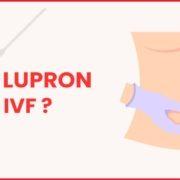What is a trigger shot in IVF
IVF Trigger Shot – In-vitro Fertilisation treatment commonly known as IVF consists of various stages. You will be exposed to medications and tests at every step. This is done to increase the success rates of the treatment. Medications are administered to the couple as per their needs. The most common medication that is administered to women comes in the form of a trigger shot.
In this article, we are going to understand what is a trigger shot in IVF, its need, side effects, precautions, administration, and its role in deciding the success rate of the entire IVF procedure.
IVF and Trigger Shot
Pregnancy is the result of the formation of an embryo when the fusion of egg and sperm happens in the fallopian tube. But what if the egg is not mature or in the worst scenario no egg is released by the ovaries?
This is where In-vitro Fertilisation and trigger shot comes into the picture.
IVF is the most suitable treatment option for couples who have the following medical conditions-:
- Polycystic Ovarian Syndrome (PCOS)
- Endometriosis
- Blocked fallopian tubes
- History of ectopic pregnancy
- Low sperm count
- Azoospermia
- Repeated IUI failures
What is a Trigger Shot?
The word trigger means to start or initiate and shot means injection. Combining these two we can say that a trigger shot is a hormonal injection that initiates the maturation and release of eggs by the ovaries.
The two most common trigger shots widely used for IVF are hCG and Lupron. hCG which stands for human chorionic gonadotropin is a hormone while Lupron is a drug.
Lupron is a non-hCG drug that is often recommended when the woman has a high risk of developing OHSS. Otherwise, hCG as a trigger shot is the first choice of fertility experts around the globe.
A trigger shot is not a necessary step in IVF.
It entirely depends on your requirements. The doctor will thoroughly analyze the ovulation process and other aspects to develop a treatment plan for you.
What is the need for a Trigger Shot?
Every woman has two ovaries which are responsible for releasing a mature egg every month for fertilisation. The quality of this egg and the well-being of the reproductive system decide your chances of getting pregnant.
In many infertility cases, the ovaries are not able to release mature eggs every month. This entire process of egg maturation and release is governed by Luteinizing Hormone (LH) and follicle-stimulating hormone (FSH).
Poor quality eggs mean poor chances of pregnancy. A trigger shot helps address this problem associated with IVF treatment.
For this, we need to understand what the IVF procedure is all about.
In-vitro Fertilisation is the process of fertilization that takes place naturally in the fallopian tubes on a petri dish in a laboratory.
For this to happen the eggs released by the ovaries are collected by the doctor.
Trigger shot makes sure the ovaries produce mature eggs which can develop into strong and healthy embryos. They are vigilantly monitored by fertility experts and get implanted in the uterine cavity.
Ideally, a trigger shot is used when:
- The ovaries are unable to release eggs on their own naturally
Timing the release of eggs for the egg retrieval process for IVF
- The underlying cause of infertility is unknown
How long after the trigger shot does it take for you to ovulate?
It will take around 24 to 36 hours for the mature eggs to be released by the ovaries after the administration of the trigger shot.
Does the trigger shot stay in your body for too long?
Typically half of the initial concentration of the hCG injection is active for 24 to 36 hours inside your system. The remaining half concentration will also come out of your system depending on your metabolism, method of administration, and body mass index. It roughly takes 10 days for the injected hCG to come out.
When to take a Pregnancy Test?
hCG is secreted after implantation of the embryo in the uterine cavity. This happens naturally to maintain the levels of estrogen and progesterone. When you take a pregnancy test after implantation it turns positive due to the presence of hCG in the urine.
But when an hCG trigger shot is administered to you there are chances that you will witness false positives on the pregnancy test kit.
So when is the right time to take a pregnancy test following a IVF trigger shot?
It is best to wait for at least 14 to 15 days after the trigger shot. To confirm the implantation it is best to visit your fertility expert after taking an at-home pregnancy test.
Early signs of pregnancy post-trigger shot may include breast tenderness, fatigue, missed periods, frequent urination, and nausea.
When to take the IVF Trigger Shot?
Timing of the trigger shot is extremely important in an IVF cycle. The fertility specialist will closely monitor the growth of ovarian follicles. Once the doctor is satisfied with the size of the dominant follicle which should be above 16-18 millimetres trigger shot will be administered to you. Then you will be asked to have sexual intercourse after a few hours to increase the chances of fertilization.
This greatly helps the doctor to schedule your IUI treatment in which the sperm is directly injected into your uterine cavity.
For IVF, the trigger shot will help decide the best time for the egg retrieval process. You will be asked to take the trigger shot 34 to 36 hours before your scheduled egg retrieval appointment. This promotes the process of meiosis: a process of cellular division.
This gives a good chance to collect all the good quality chromosomally normal mature eggs for fertilization with a motile and healthy sperm.
The timing of the trigger shot will vary from clinic to clinic and according to the development of your egg follicles.
Set an alarm, ask someone in your family to remind you, and put a sticky note on the refrigerator. But do not take it lightly, timing has a lot to do with the quality of eggs that will be retrieved.
How to take the IVF Trigger Shot?
You will need a prefilled Ovidrel syringe, alcohol swab, and gauze.
First step-: Clean the injection site properly.
Second step-: Take the syringe and place it on the abdomen, a few inches from your navel.
Third step-: Disinfect the area with alcohol to minimize the chances of infection.
Fourth step-: Direct the needle at an angle of 45 to 90 degrees and empty the contents in the syringe.
The doctor will personally guide you on how to take the trigger shot. If you do not feel confident in taking the shot yourself then you can visit your fertility expert for help.
Side effects of Trigger Shot
There are no harmful side effects associated with the administration of a trigger shot. However, pain or irritation at the injection site is quite common. You might also experience abdominal cramps or mild bloating.
A concerning side effect is OHSS. It stands for ovarian hyperstimulation syndrome. It is a result of swelling of ovaries which leads to fluid leakage in other parts of the body. Sometimes trigger shots stimulate the ovaries to produce more eggs than usual which leads to OHSS.
The good news is that OHSS is not a common side effect.
If you have mild OHSS you might have the following symptoms:
- Abdominal cramps
- Vomiting
- Nausea
- Bloating
- Diarrhea
Cases of moderate and severe OHSS are quite rare. Some common symptoms of severe OHSS are as follows:
- Severe abdominal cramps
- Difficulty in breathing
- Constant vomiting
- Formation of blood clots
- Rapid weight gain
- Decreased urination
If you feel something is not right consult your fertility expert without thinking twice. Do not let your stress levels shoot up. IVF success rates are largely dependent on your stress management skills.
Is the administration of a trigger shot painful
The intensity of pain from a trigger shot largely depends on your sensitivity to injections. The method of administration also has a role to play.
Trigger shots can be administered in two ways namely intramuscular and subcutaneous.
Intramuscular means the injection is administered into the muscle. While subcutaneous means administration of the shot under the skin.
The specialists prefer to go for subcutaneous administration of IVF trigger shot which is less painful.
Sometimes the injection spot becomes red, itchy, or inflamed. But the discomfort lasts only for a day or two and these signs go away.
What to do if you miss your trigger shot?
First of all, do not panic and take some deep breaths. Visit your fertility expert to discuss the situation and further the line of action.
Find the right Fertility Clinic
The role of the fertility center in your infertility treatment journey can’t be emphasized enough. From tracking the progress of the egg follicles to retrieving the mature eggs the entire procedure demands a team of experts.
If you are looking for a fertility center in Srinagar then look no further. We at Imprimis IVF are here to guide you in your journey towards parenthood.
Visit us at Imprimis IVF, Srinagar for more information.
Final Words
Trigger shot plays a vital role in IVF treatment but it is not for everyone. Every individual is unique and so are the requirements. Do not follow everything that is written on the web and visit a doctor.
Let your doctor decide what’s best for your IVF journey. But if trigger shots are involved in your plan then make sure you are punctual and follow your doctor’s instructions religiously.
Trust the process and your efforts. Follow a healthy lifestyle and keep your stress levels in check. We hope this article by Imprimis IVF was helpful to you.










